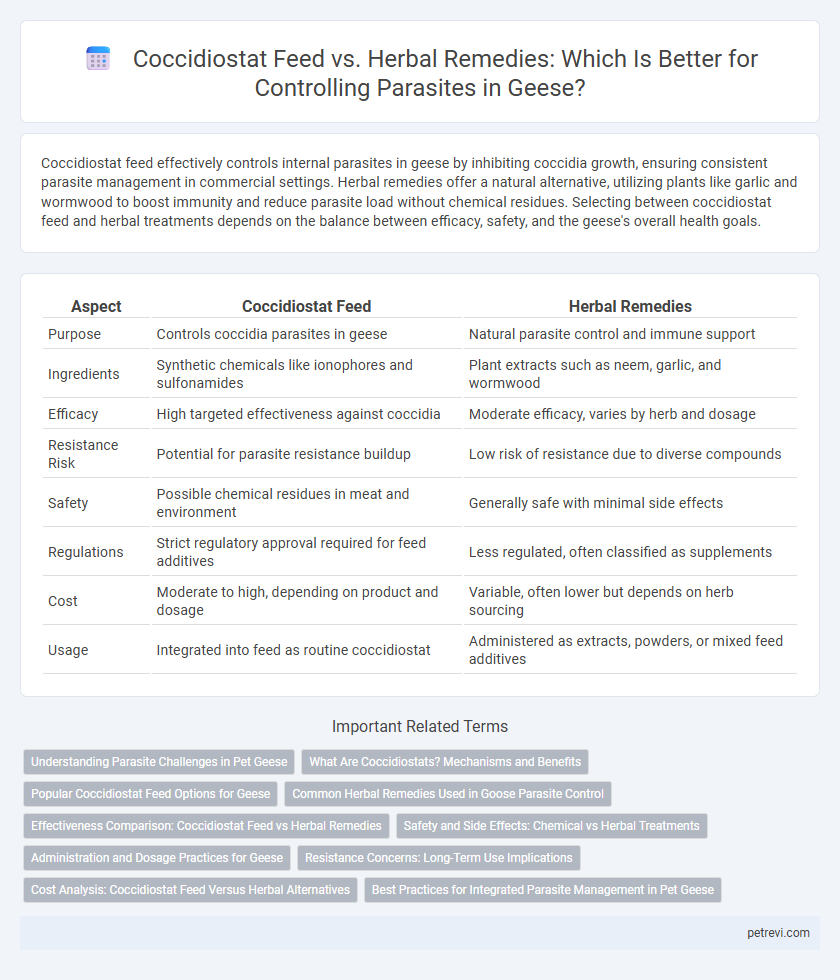Coccidiostat feed effectively controls internal parasites in geese by inhibiting coccidia growth, ensuring consistent parasite management in commercial settings. Herbal remedies offer a natural alternative, utilizing plants like garlic and wormwood to boost immunity and reduce parasite load without chemical residues. Selecting between coccidiostat feed and herbal treatments depends on the balance between efficacy, safety, and the geese's overall health goals.
Table of Comparison
| Aspect | Coccidiostat Feed | Herbal Remedies |
|---|---|---|
| Purpose | Controls coccidia parasites in geese | Natural parasite control and immune support |
| Ingredients | Synthetic chemicals like ionophores and sulfonamides | Plant extracts such as neem, garlic, and wormwood |
| Efficacy | High targeted effectiveness against coccidia | Moderate efficacy, varies by herb and dosage |
| Resistance Risk | Potential for parasite resistance buildup | Low risk of resistance due to diverse compounds |
| Safety | Possible chemical residues in meat and environment | Generally safe with minimal side effects |
| Regulations | Strict regulatory approval required for feed additives | Less regulated, often classified as supplements |
| Cost | Moderate to high, depending on product and dosage | Variable, often lower but depends on herb sourcing |
| Usage | Integrated into feed as routine coccidiostat | Administered as extracts, powders, or mixed feed additives |
Understanding Parasite Challenges in Pet Geese
Parasite challenges in pet geese, such as coccidiosis, demand effective control strategies to ensure their health and growth. Coccidiostat feed contains synthetic compounds targeting protozoan parasites, providing reliable prevention and treatment, while herbal remedies use natural extracts with varying efficacy and limited scientific validation. Understanding the life cycle of common parasites like Eimeria spp. and evaluating the specific needs of pet geese helps optimize parasite control methods, balancing safety, effectiveness, and environmental impact.
What Are Coccidiostats? Mechanisms and Benefits
Coccidiostats are specialized feed additives used in goose farming to prevent and control coccidiosis, a common parasitic disease caused by protozoa. These compounds work by inhibiting the development and reproduction of coccidia within the intestinal tract, thereby reducing parasite load and improving nutrient absorption. The benefits of coccidiostats include enhanced growth rates, improved feed conversion ratios, and lowered mortality rates, making them a critical tool in maintaining flock health and productivity.
Popular Coccidiostat Feed Options for Geese
Amprolium, Decoquinate, and Diclazuril are among the popular coccidiostat feed options used for effective coccidia parasite control in geese. These coccidiostats inhibit the development of Eimeria species in the intestinal tract, reducing morbidity and improving growth performance. Regular inclusion in feed, combined with proper dosing protocols, ensures optimal control of coccidiosis in goose flocks.
Common Herbal Remedies Used in Goose Parasite Control
Common herbal remedies used in goose parasite control include garlic, pumpkin seeds, and thyme, known for their natural antiparasitic properties. Garlic contains allicin, effective against intestinal parasites, while pumpkin seeds have cucurbitacin, which paralyzes worms. Thyme offers thymol, an active compound that disrupts parasite metabolism, making these herbs a natural alternative to synthetic coccidiostat feeds.
Effectiveness Comparison: Coccidiostat Feed vs Herbal Remedies
Coccidiostat feed offers targeted control of coccidia parasites in geese through active pharmaceutical compounds that inhibit parasite growth, ensuring faster and more consistent results. Herbal remedies rely on natural antiparasitic properties from plants like neem and garlic, but their effectiveness varies due to differences in formulation and parasite resistance. Studies show coccidiostat feed generally provides higher efficacy in reducing parasite load, while herbal treatments serve as complementary options with fewer chemical residues.
Safety and Side Effects: Chemical vs Herbal Treatments
Chemical coccidiostats used in goose parasite control often carry risks of toxicity, residue accumulation, and drug resistance, posing safety concerns for both birds and consumers. Herbal remedies offer a safer alternative with natural bioactive compounds that minimize adverse side effects and reduce the likelihood of resistance development. Choosing herbal treatments improves overall flock health while maintaining food safety standards in goose production.
Administration and Dosage Practices for Geese
Coccidiostat feed typically requires strict adherence to manufacturer-recommended dosages and continuous administration in water or feed to effectively control coccidiosis in geese. Herbal remedies, such as extracts from neem or oregano, are often administered in varying dosages based on age and weight, with flexibility in delivery methods including feed additives or oral drenching. Proper dosage practices for both methods are crucial for optimizing parasite control while minimizing toxicity and resistance risks in geese.
Resistance Concerns: Long-Term Use Implications
Coccidiostat feed is widely used in goose parasite control but poses significant resistance concerns due to the potential development of drug-resistant parasite strains with long-term use. Herbal remedies offer an alternative approach by leveraging natural antiparasitic compounds that reduce the risk of resistance and maintain parasite susceptibility over time. Integrating herbal treatments can enhance sustainable parasite management strategies for geese while preserving coccidiostat efficacy.
Cost Analysis: Coccidiostat Feed Versus Herbal Alternatives
Coccidiostat feed typically incurs higher upfront costs due to synthetic ingredient pricing and regulatory compliance, whereas herbal remedies offer a cost-effective alternative with lower production expenses and easier sourcing. Long-term cost analysis reveals that herbal treatments may reduce overall expenses by minimizing drug resistance and residue concerns, which can lead to less veterinary intervention. Evaluating the total cost of parasite control for geese requires balancing initial expenditures against potential savings from improved health outcomes and consumer preference for natural products.
Best Practices for Integrated Parasite Management in Pet Geese
Effective parasite control in pet geese combines coccidiostat feed with herbal remedies to enhance gut health and reduce parasite resistance. Using coccidiostats ensures targeted elimination of coccidia, while herbal supplements like garlic and wormwood support immune function and natural parasite deterrence. Integrated parasite management prioritizes regular fecal testing, rotational feeding strategies, and maintaining clean living environments to minimize parasite loads sustainably.
Coccidiostat Feed vs Herbal Remedies for Goose Parasite Control Infographic

 petrevi.com
petrevi.com